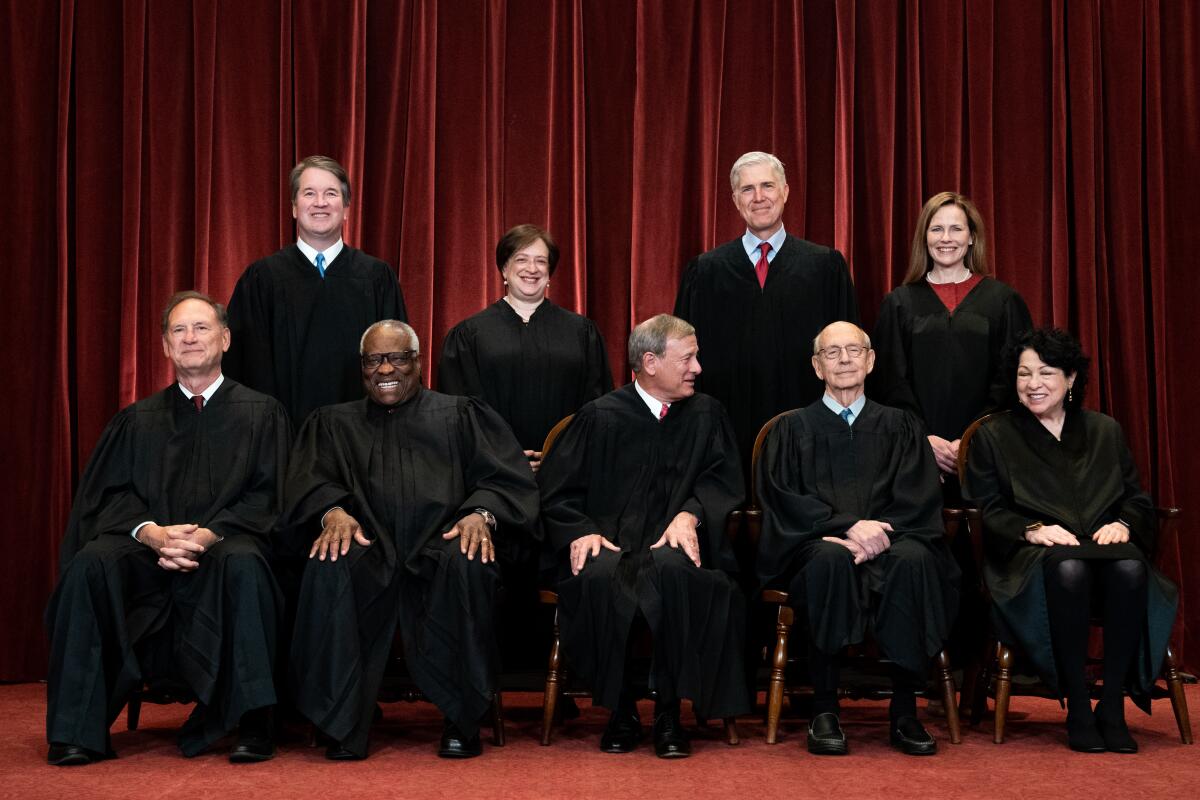Column: Is Clarence Thomas a nice guy? Would you want to be his friend?

- Share via
For years, Americans were fascinated by the strange and unexpected friendship between Supreme Court Justices Ruth Bader Ginsburg, a liberal icon, and Antonin Scalia, an arch-conservative. The two disagreed on everything imaginable about the law but bonded outside the office over their love of opera, food and travel. They spent New Year’s Eve together.
How could they be such good friends, people wanted to know, when they were also such adamant adversaries? In an era of creeping political polarization, it defied logic and made some Americans uncomfortable.
Now — two years after Ginsburg’s death and six years after Scalia’s — such a relationship is even harder to fathom. The nation has grown angrier, and the court more partisan. Between last month’s leaked draft opinion, the clashing visions of the Constitution and the court’s shifting ideological balance, one might naturally expect hostility among the justices to have increased.
Opinion Columnist
Nicholas Goldberg
Nicholas Goldberg served 11 years as editor of the editorial page and is a former editor of the Op-Ed page and Sunday Opinion section.
In a matter of days, the conservatives who now hold the majority on the court are expected to eviscerate abortion rights and expand gun rights. And God knows what they’ll do next, to the horror of liberals on the court and progressives around the country. This is no time for friendships, it would seem.
Except apparently it is. Last week, Justice Sonia Sotomayor, often considered the court’s most liberal member, went out of her way to talk publicly about her warm feelings toward the court’s most conservative member, Justice Clarence Thomas.
It’s true, she told a roomful of lawyers, that the two have different philosophies of life and different visions of how the law can help people. But Thomas is a beloved figure at the court, she said. He knows the name of every employee in the building. He was the first to send flowers when her stepfather died.
He’s kind, she said.
“That’s why I can be friends with him and still continue our daily battle over our difference of opinion in cases,” she said.
It was striking that she chose such a fraught moment to make her statement — on the eve of the expected reversal of Roe vs. Wade, and just as Thomas’ wife is being scrutinized for her role in the plot to overturn the 2020 presidential election.
Justice Clarence Thomas describes the leak of a Supreme Court draft opinion earlier this month as a breach of trust.
Unsurprisingly, Sotomayor’s comments didn’t go over well with her usual supporters.
“Bunk!” tweeted one.
“So tone deaf,” wrote another.
“She was either drinking or smoking marijuana.”
“Oh [expletive deleted] gag me.”
The fact is that collegiality of the Ginsburg-and-Scalia sort is, to put it mildly, out of fashion these days. Instead, antipathy between liberals and conservatives around the country is the norm, and Democrats and Republicans increasingly see each other as immoral, close-minded and unpatriotic.
Members of Congress who were complicit in Trump’s attempted coup — including six representing California districts — do not deserve to be reelected.
To many Americans on the left and the right, this is a time for battle stations, not dates at the opera. Friendships across the aisle and even basic civility toward one’s adversaries are often viewed as a kind of betrayal or at least hypocrisy. Efforts on the part of politicians to find common ground are seen by many as consorting with the enemy, or as a surefire way to be taken advantage of.
I get it, sort of. Our problems these days are so serious that collegiality and cooperation feel beside the point. What’s the use of saying a polite good morning to an irrational person like Rep. Marjorie Taylor Greene (R-Ga.) or working on legislation with callow, self-interested Rep. Madison Cawthorn (R-N.C.) or arguing policy with someone as disengaged and demagogic as former President Trump?
But the alternative — retreating to our corners, demonizing opponents and giving up on constructing mutually agreeable solutions — makes no sense either.
I’ll be lambasted for saying it, but democracy requires cooperation and compromise with one’s political opponents; that’s almost its definition. It requires a basic (even if grudging) respect for adversaries — and if you can’t muster that, then it requires at least an adherence to agreed-upon rules and norms. It requires a belief that debate and deliberation can lead to progress.
That’s true at the Supreme Court just as it is in Congress.
As the Jan. 6 committee hearings continue, Rep. Liz Cheney’s GOP colleagues don’t understand why she’s risking her seat to defy the party and Trump.
I abhor Clarence Thomas’ politics. And I’m well aware that it doesn’t matter in the long run whether he’s a nice guy who chats up the staff. Ultimately history will judge him on his judicial legacy, not his charm.
But Sotomayor and her colleagues have to work with him. They do work with him.
Frankly, I don’t think engagement among adversaries requires one to be steamrolled or to abandon one’s core beliefs. I believe, as Sotomayor apparently does, that it’s possible to fight respectfully while also fighting fiercely for what you believe.
Not that we should compromise with white supremacists or insurrectionists or liars or adherents of QAnon. Such people need to be marginalized while more reasonable people work together.
Got a precedent you don’t like? Now’s your chance to have it struck down by a newly aggressive conservative court.
Americans need to make democracy function again. That means putting aside the notion that one side wins only if the other side loses. It means playing by the rules, not breaking them. And it means, where possible, recognizing the humanity of those we disagree with.
“You really can’t begin to understand an adversary unless you step away from looking at their views as motivated in bad faith,” said Sotomayor last week. Instead, you have to “think about what the human reaction is that’s motivating those views.”
I would find that hard to do for Donald Trump or Marjorie Taylor Greene. And perhaps for Clarence Thomas too. But I’m glad Sotomayor is giving it a try, as long as she also keeps fighting for what is right.
More to Read
A cure for the common opinion
Get thought-provoking perspectives with our weekly newsletter.
You may occasionally receive promotional content from the Los Angeles Times.
















